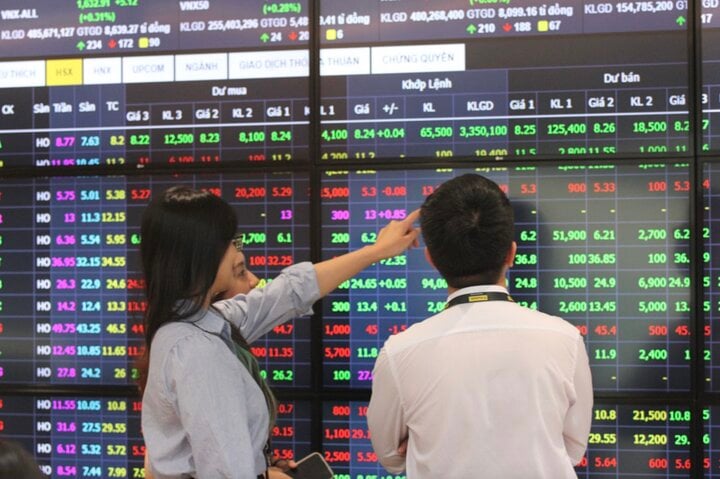Mr. Ngo Thanh Huan, Director of Personal Finance at FIDT JSC, opined that the stock market is the most attractive investment channel in the last months of 2024. He explained that the stock market is usually more “sensitive” to economic fluctuations. Specifically, stocks tend to grow before the economy recovers and fall before economic downturns.
“In the past, since around October 2022, stocks have bottomed out, and then by mid-2023, the economy will bottom out. Before the economy grows, stocks will also rise, and vice versa, the economy is currently in a recovery trend, which is a driving force for economic growth,”
Mr. Huan stated.
With the recovery trend, Mr. Huan predicted that the stock market would have more prospects for development. Regarding the investment portfolio, Mr. Huan suggested that investors should pay attention to sectors such as finance – banking, real estate, and industry. However, he also emphasized that investing in stocks requires patience and a long-term vision. Investors should have a clear plan and should not focus too much on short-term profits.
Identifying potential sectors in the last months of 2024 is not solely based on positive macro signals but also requires an in-depth analysis of the specific factors of each industry.

(Illustration: Government Newspaper)
Which stock sectors are easy to profit from at the end of the year?
Expressing his personal view, Mr. Tran Manh Hoang Viet, a financial planner at FIDT Investment Consulting and Asset Management JSC, said that stocks in the banking, securities, and real estate sectors are likely to break out at the end of the year.
The
banking sector
is expected to continue benefiting from the low-interest-rate policy maintained by the State Bank of Vietnam to support the economy. In addition, the positive trend of the economy is also reflected in the 6.93% GDP growth in the second quarter. In the global market, expectations of interest rate cuts by the US Federal Reserve, along with signs of economic recovery, have immediately been reflected in global stock markets.
These factors promote credit growth, especially as businesses’ demand for borrowing increases due to public investment projects and recovering business activities. Moreover, controlled inflation allows the State Bank to maintain its loose monetary policy. This is a significant advantage as cheaper capital will enable banks to enhance their competitiveness and improve profits.
“However, for the banking sector, bad debt remains a significant challenge. Although the economy is recovering, some units still face difficulties, especially in industries severely affected by the pandemic. The bad debt ratio of banks is currently about 4.56%, and if the economy does not recover fast enough, this ratio may continue to rise, affecting banks’ profitability and asset quality,”
Mr. Viet analyzed.
Furthermore, competition in the industry is intensifying, especially as small and medium-sized banks must find ways to grow in a volatile environment. Rapid credit expansion can also lead to asset quality risks, especially if the economy does not grow as expected.
Meanwhile, the
securities sector
may benefit from the low-interest-rate trend, attracting funds from savings channels into the stock market. According to statistics, the average transaction value per session on the entire market (HoSE, HNX, UPCoM) in the first six months reached VND 24,598 billion/session, up 39.9% compared to the previous year’s average. This reflects investors’ confidence in the long-term prospects of securities.
Additionally, the expectation of an upgrade by FTSE Russell in September is an important factor in attracting foreign investors’ interest. If Vietnam is upgraded to an emerging market, foreign capital may return strongly, promoting sustainable growth in Vietnam’s stock market.
However, over-reliance on foreign capital remains a risk. In the first months of 2024, foreign capital withdrew from the market due to concerns about the global macroeconomic situation, putting pressure on the Vietnamese stock market to adjust. If global macroeconomic factors are not favorable, this capital may continue to be withdrawn, negatively affecting the market’s growth prospects.
Exchange rate fluctuations are also a factor to consider. Although the USD has cooled down, unexpected developments in the international financial market may impact investors’ psychology and capital inflows into the market.
Regarding the
real estate sector
, Mr. Viet believed that industrial and residential real estate is receiving positive support from the government’s policies. New laws such as the 2024 Land Law and the 2023 Housing Law provide a more favorable legal corridor, enabling well-governed enterprises to seize development opportunities.
Low borrowing rates also make it easier for real estate businesses to access capital to implement projects. In the second half of 2024, many large-scale real estate projects are expected to be launched, creating new supply for the market. This will drive revenue and profits for businesses in the industry.

Illustration: Finhay.
However, the real estate market still faces many risks, especially segmentation. Only large enterprises with strong financial capabilities can take advantage of the opportunities presented by the new policies. Smaller enterprises or those that have faced significant financial pressures in recent years may struggle to raise capital and implement projects.
Additionally, weak demand in some real estate segments, particularly high-end housing, remains an obstacle. Even with low-interest rates, if people’s incomes do not increase correspondingly, buying power will remain limited, affecting sales and business revenue.
“In the last quarter of 2024, although there are many attractive investment opportunities, investors need to be cautious in selecting stocks. The banking sector may benefit from low-interest rates, but bad debt risks remain. The securities sector has potential but still needs to monitor and assess exchange rate fluctuations, inflation, and foreign capital trends. The real estate sector is improving, but only financially strong enterprises can seize the opportunity,”
Mr. Viet concluded.
Mr. Viet further advised that to achieve the best results, investors should focus on enterprises with good risk management, strong financial capabilities, and a clear long-term development strategy. Careful research and detailed analysis of both macro and micro factors will help mitigate risks and optimize profits in the last months of the year.
The Rise of Stock Market Investing Through E-Wallets: A New Era of Financial Opportunity
Many retail investors are now turning to stock trading via e-wallets with very small capital, and they’re even utilizing AI to help them “ride the waves” of the market.


















